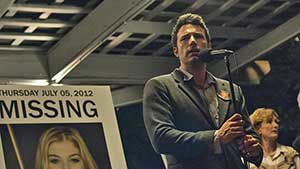Despite his famous ego as an auteur, Orson Welles paid a great compliment to Gregg Toland by sharing a title card with the cinematographer on Citizen Kane. This crossed my mind as I saw your name in the opening credits for David Fincher's thriller Gone Girl. Your name's not on the screen alongside Fincher's, but the placement is telling.
Sound designers, like you, are usually listed in the end credits — the end of the end credits, actually. Without going into the politics of movie credit hierarchy, I think it might be a bit of nod to the importance of your contribution that your name is listed so highly.
Gone Girl is directed by David Fincher — often referred to as one of the most stylistically baroque filmmakers working today. So you might expect a sound design to match. But Fincher's come a long way since the days of Alien 3, Seven, and Fight Club. He's now one of Hollywood's most consistently reliable directors for turning in smart, exquisitely crafted dramas (let's all agree to overlook The Curious Case of Benjamin Button, shall we?) that know exactly when—and more importantly when not—to go over the top. Fittingly, your sound design here syncs up perfectly with this more understated approach. And thank God for that.
I've grown increasingly tired with modern sound design where everything, diagetic or not, needs a sound effect. Everything. I don't know exactly when this started, but I became acutely aware of it in the mid 90s, around the time foley artists decided cigarettes needed to make a burning sound whenever a character took a drag. Little did I know we were heading into an era where even filmmaking techniques—camera pans, fades edits—would have their own library of sound effects. So much for the invisible arts.
But Fincher, a savant to film craft if there ever was one, is far too smart to fall for these trappings. By taking everything—your sound design included, Ren—down to their basic, least intrusive forms, Fincher creates a setting that feels natural even as events start to go, well, bananas. Gillian Flynn's 2012 novel is well-known for some pretty out-there plot twists, and her script keeps the craziness in-tact. Fincher and all of his collaborators respond to this, toning everything else down. And it works.
Alfred Hitchcock famously said that tension was created when the audience knew more than the characters did. The camera, providing an omniscient point of view, could reveal details to us that the characters could not know. In Gone Girl, Fincher and Flynn flip this premise on its head. Ben Affleck's Nick Dunne returns home on his fifth wedding anniversary to find his wife Amy missing, and signs of a struggle in the house. After bringing in the authorities to investigate, Dunne quickly becomes the prime suspect. Did he do it or not? That's the question that preoccupies much of Gone Girl.
The anti-Hitchcock element here is that the one person who knows this answer for sure—Dunne—is both our point-of-entry to the story and an opaque mystery. Where something like The Fugitive gets its righteous propulsion from our knowledge that Richard Kimble is innocent, Gone Girl asks us to invest ourselves in someone who might very well be a murderer. Again, and against the odds, it works.
Casting Affleck as Dunne may be the film's greatest strength: Affleck brings just enough "how could this happen to a fun-loving guy like me?" entitlement that, along with the more tangible character faults of Dunne himself, make us want to question his every motive. That Rosamund Pike as Amy, the titular girl, represented almost entirely in flashbacks informed by her own diary entries gives us one more level of remove from Dunne — and one more reason not to trust him.
But that's just part of what Gone Girl has in store. As the film moves from its early procedural tone to something much more outlandish, it actually starts to feel like a combination of both the old and new Fincher, specifically a grafting together of Zodiac and The Game. And as things get crazier—and lets face it, much of Gone Girl's second half is flat out ridiculous – your sound design goes along for the ride. I'm not saying you ever go full-out-Tony-Scott-sound-design crazy, but the sound definitely starts to become a bigger presence near the end. As it does this, though, the film itself shifts tone again, trading in claustrophobic thriller for something approaching black comedy.
These are all subtle changes, mind you. The intentional shifts in the film's style give us permission to enjoy Gone Girl for the tawdry, insane narrative it is. That's a tricky balancing act to pull off without turning into a parody, but everyone involved does just that.
Enjoying your above-the-line status,
Casey







